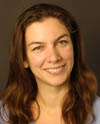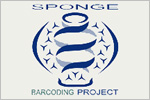New Humboldt-Fellows at the Chair of Palaeontology & Geobiology
01.05.2010
Two more holders of Humboldt Research Fellowships have arrived at LMU. Drs. Azizur Rahman and Claire Larroux will each devote themselves to research in their respective fields for two, resp. one year at the Chair of Palaeontology & Geobiology, with financial support from the Alexander von Humboldt Foundation. The Alexander von Humboldt Foundation makes it possible for highly qualified post-doctoral researchers from other countries to carry out a research project of their own design anywhere in Germany. As fellows are free to choose the host institution themselves, the number of fellows on campus is an important indicator of a university’s international standing.
 Azizur Rahman obtained his MSc degree in 2003 at the Department of Chemistry, Biology and Marine Sciences at the University of the Ryukyus in Okinawa, Japan. He was awarded his PhD for work done at the Department of Marine and Environmental Sciences at the same institution. His research is concerned with the process of calcification in corals, which he studies using the techniques of proteomics. He is also interested in understanding the effects of climate change on coral reefs. Dr. Rahman’s project at LMU will be carried out with Professor Gert Wörheide’s group at the Institute of Palaeontology and Geobiology in the Department of Geological and Environmental Sciences. Here he intends to investigate the process of biomineralization in corals, with the goal of identifying new proteins and genes involved in forming the organic scaffolds for mineralization, and elucidating the role of carbonic anhydrase enzymes (CAs) in the mechanism of coral calcification.
Azizur Rahman obtained his MSc degree in 2003 at the Department of Chemistry, Biology and Marine Sciences at the University of the Ryukyus in Okinawa, Japan. He was awarded his PhD for work done at the Department of Marine and Environmental Sciences at the same institution. His research is concerned with the process of calcification in corals, which he studies using the techniques of proteomics. He is also interested in understanding the effects of climate change on coral reefs. Dr. Rahman’s project at LMU will be carried out with Professor Gert Wörheide’s group at the Institute of Palaeontology and Geobiology in the Department of Geological and Environmental Sciences. Here he intends to investigate the process of biomineralization in corals, with the goal of identifying new proteins and genes involved in forming the organic scaffolds for mineralization, and elucidating the role of carbonic anhydrase enzymes (CAs) in the mechanism of coral calcification.
 Claire Larroux studied Natural and Life Sciences at the Université de Paris VII (Jussieu), obtaining her primary degree in Natural Sciences in 1996, and a Master’s degree in the Biology of Populations and Ecosystems at the Université de Paris VI (Pierre & Marie Curie) in 1997. In 2007 she earned her PhD at the School of Integrative Biology at the University of Queensland in Australia. Claire Larroux’s research interest lies in the area known informally as Evo-Devo, and centers on the evolution of tissue development in marine sponges. Evo-Devo (Evolution and Development) refers to an interdisciplinary approach that combines techniques and insights from evolutionary biology, developmental biology and genetics to study the molecular basis for the diversification of organisms. She has also coordinated the sequencing of the first complete sponge genome, the results of which will be published shortly. At LMU she too will work at the Institute for Palaeontology and Geobiology with Professor Gert Wörheide. The goal of her project is to determine whether or not the epithelia (the cell sheets that form tissue surfaces) found in sponges are orthologous to those of more advanced organisms, i.e. whether the genes responsible for specifying the architecture of epithelial tissues are orthologous. Genes are referred to as orthologous if they perform related functions in different species and are derived from a common ancestor. By comparing gene sequences coding for the adhesion proteins that hold cell sheets together in different species, Claire Larroux hopes to define the nature of the most primitive or ur-epithelium and investigate the evolutionary transition from single-cell to multicellular organisms.
Claire Larroux studied Natural and Life Sciences at the Université de Paris VII (Jussieu), obtaining her primary degree in Natural Sciences in 1996, and a Master’s degree in the Biology of Populations and Ecosystems at the Université de Paris VI (Pierre & Marie Curie) in 1997. In 2007 she earned her PhD at the School of Integrative Biology at the University of Queensland in Australia. Claire Larroux’s research interest lies in the area known informally as Evo-Devo, and centers on the evolution of tissue development in marine sponges. Evo-Devo (Evolution and Development) refers to an interdisciplinary approach that combines techniques and insights from evolutionary biology, developmental biology and genetics to study the molecular basis for the diversification of organisms. She has also coordinated the sequencing of the first complete sponge genome, the results of which will be published shortly. At LMU she too will work at the Institute for Palaeontology and Geobiology with Professor Gert Wörheide. The goal of her project is to determine whether or not the epithelia (the cell sheets that form tissue surfaces) found in sponges are orthologous to those of more advanced organisms, i.e. whether the genes responsible for specifying the architecture of epithelial tissues are orthologous. Genes are referred to as orthologous if they perform related functions in different species and are derived from a common ancestor. By comparing gene sequences coding for the adhesion proteins that hold cell sheets together in different species, Claire Larroux hopes to define the nature of the most primitive or ur-epithelium and investigate the evolutionary transition from single-cell to multicellular organisms.





